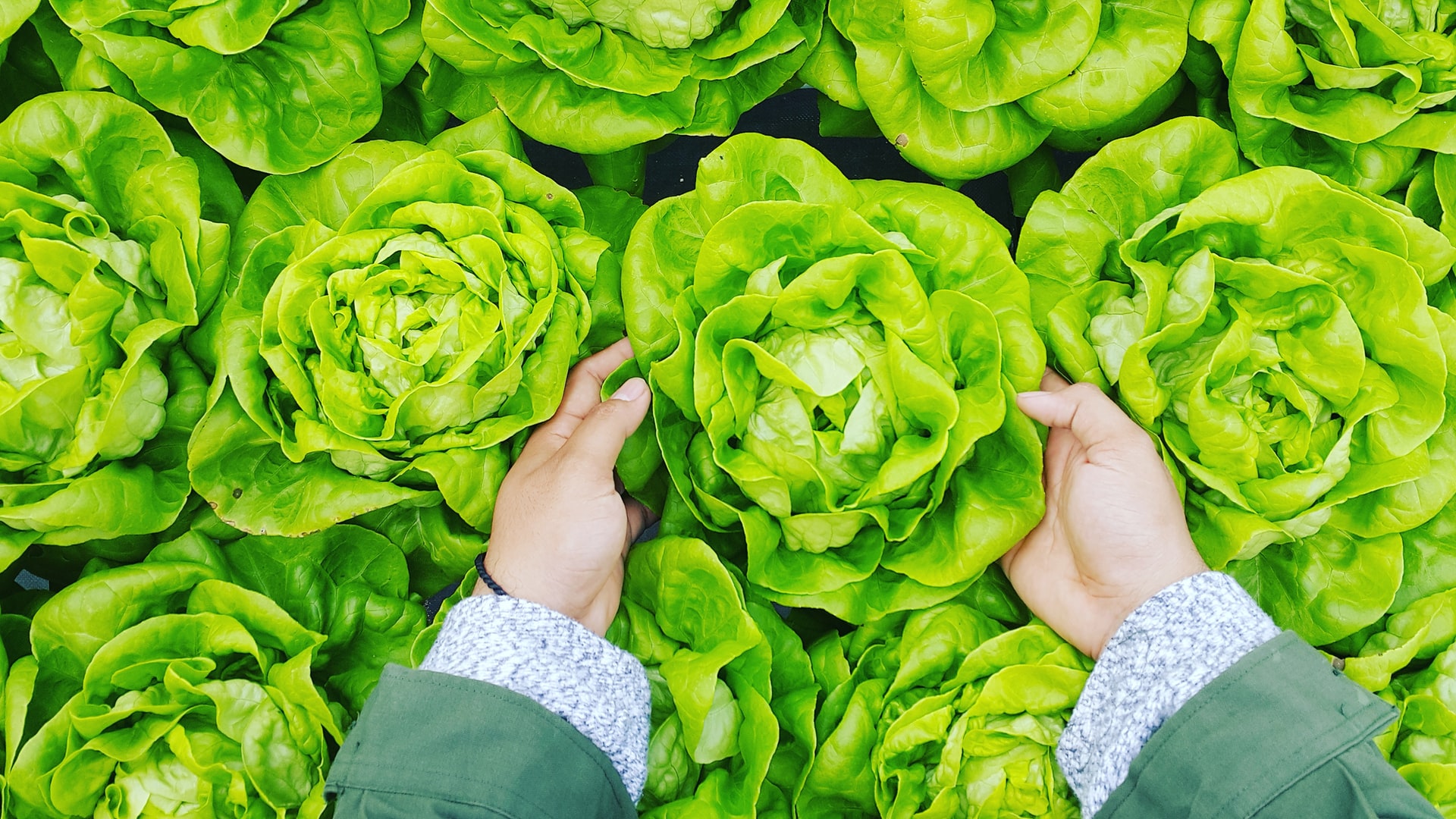
Food for Thought
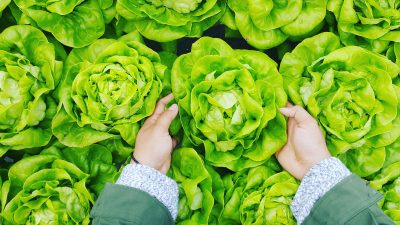
If you knew me, then you’d know that I’m a big foodie. I love going out for dinner. I love cooking (and being cooked for), and I just generally love eating – I mean, who doesn’t?
Lately, I’ve been considering the environmental impact of my dietary choices and wondering if there’s something I could do or change in my personal life to lessen my impact on the planet. One of the changes I’ve particularly noticed a number of my friends making is the switch to a vegetarian or vegan diet.
To be honest, I’ve always thought this a little extreme. I’ve always wondered how much impact this change could actually make. After all, it’s a handful of people ditching animal products in a sea of Aussie BBQ and meat pie culture. In the grand scheme of things, their efforts – to me – felt like drops in the ocean, creating ripples yes, but no great waves to any avail.
There’s no doubt that as a country, we over-consume meat and dairy products, but they’re the backbone of our nation. According to Sustainability.org, we consume three times the amount of meat recommended by health guidelines for the average person. This way of life – our celebration of meat consumption – not only affects our health (leading to unhealthy weight gain, heart disease and stroke, according to Sustainability. org), but contributes to the degradation of the environment in so many ways.
In every stage of food production to food retail, our natural resources are being expended and unnecessary waste is being created – more so for animal products, as you can see from the following infographic.
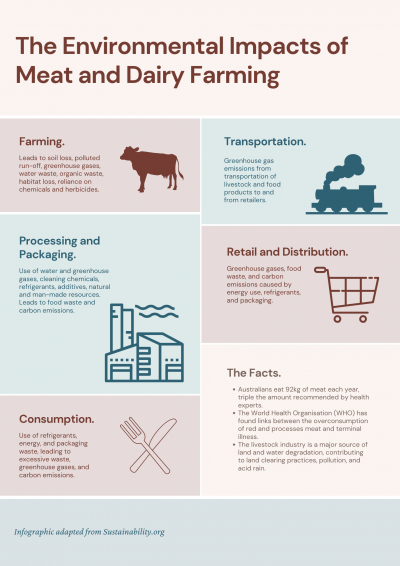
One of the most detrimental factors of farming livestock is the sheer size of land needed for not just animals, but for the crops that feed the livestock. This has led to 75% of Australia’s rainforests and 50% of our forests being cleared over the last 200 years, according to Australian Museum. We see the same practices taking place around the world, unfortunately – remember, the Amazon rainforest burning?
It makes complete sense to switch to a vegetarian or vegan diet from a sustainability standpoint; however, how much of an impact is really created by a single person making the change?
Online you can find many articles that are either for or against veganism (or vegetarianism). Research has found that while switching from animal products to a plant-based diet does reduce your carbon footprint, indulging in certain fruits and veggies (particularly if not in season or locally-grown) pretty much cancels-out your good deed.
Evidently, being an environmentally-conscious consumer requires effort and learning; it’s hard to do it perfectly. On top of that, there’s the added social challenges that come with making a dietary change – finding new recipe ideas, spending more money on fresh produce, and dealing with all the awkward outings where you have to ask the very meat-friendly restaurant to create a makeshift vegan meal with the limited animal-free produce they have. And yes, I’m speaking from experience as I’ve witnessed this with a vegan friend who ‘enjoyed’ a very improvised (and bland) caper and olive oil gluten-free pasta (gluten free because the fresh-made pasta contained egg).
Upon surveying a sample of vegans and vegetarians from my own personal network, I found that this was by far the greatest challenge of maintaining a vegan or vegetarian diet; limited food options when eating out. That, and having to cater to or work around other peoples’ animal-based diets.
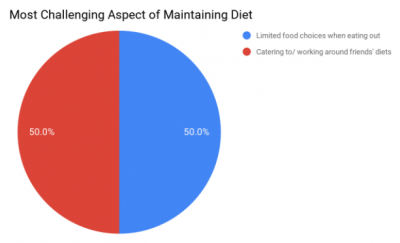
As someone who values social experiences (especially experiences pertaining to eating out), this would be a bit of a hurdle for me as a vegetarian or vegan. However, as a passionate humanitarian and environmentalist, I’m willing to make sacrifices to my own enjoyment to better the planet.
I don’t know if I’m ready yet to take the plunge as a vegan or vegetarian, but I am planning on making some changes. There’s no doubt that making choices to limit animal products is better for sustainability. So, here are some steps I am going to make moving forward that I think are easy enough for just about everyone to do.
1) Become a flexitarian
I know, it’s such a buzz word these days, but it really fits.
Personally, I think flexibility will be key to me finding balance between being sustainable and enjoying the foods I still love. Sustainability.org encourages reducing the intake of meat, dairy and eggs by half to lessen your impact on the environment, and I think that’s extremely doable.
Fortunately, a lot of the participants I surveyed that consumed meat indicated that they’re already quite flexible with their diet and have been meaning to or already are adopting plant-based eating habits like ‘Meat-free Mondays’ and generally eating more in seasonal vegetables and plants.
One of my participants explains, “I would consider myself actually flexitarian (80% veg, 20% meat diet) because I want to reduce my meat intake due to environmental and health reasons, however, won’t turn down food provided for me by family or in situations outside my control. If I can help it, I’ll choose vegetarian and plant based options.”
2) Eat seasonal and locally grown fruit and veg
I think something that many people don’t consider is the fact that their favourite fruit or vegetable isn’t always in season. Avocados don’t grow all year round folk! (At least Hass don’t, which are the best ones, let’s be honest).
To lessen the extent to which fruit and veg is distributed across Australia (and to which it requires additional resources to be grown) it’s best to avoid fruit and veg that has been harvested from other states and countries, or outside of the season that it typically grows within.
If all of that is too confusing for you to process, there’s a simple solution – checking the internet. Check the seasonal food guide for an easy-to-understand explanation of your local and seasonal produce so you can prepare and plan your shopping habits around them. This will help you buy fruit and veg that is already blooming and ready to be consumed, helping you support local farmers and sustainable practices.
3) Reuse and recycle
We all know that fruit and veg comes wrapped up in too much plastic waste. We don’t need to add to that.
Personally, I’ve started opting for purchasing fruit and veg that comes in its whole form (meaning unsliced).
I’ve also opted for bringing my own mesh bags to load loose pieces of fruit and veg. I bought these from my local bread shop, but you can get them from anywhere – or simply reuse your loose plastic bags where you can.
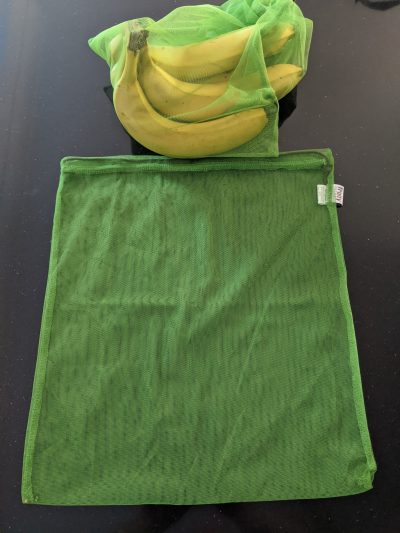
4) Remember that the industry could always do better
While I think it’s important for everyone to do their part – whatever they financially and logistically can – for the environment, I think it’s important to remember that it’s the big corporations that hold all the power.
According to my own study, 75% of participants believed that those within food industries could do more in regards to sustainability, and I whole-heartedly agree.
As one participant said, “We’ve come a long way, however, overconsumption and food waste – especially in places like the USA, where dumb amounts of food waste are being recorded each year – is a huge barrier to sustainability. It’s frustrating that big companies are too focused on profits and aren’t seeing the bigger picture… if they abuse the earth and cause irreversible effects, they won’t even have a planet to earn more money off of.”
This is reciprocated by research. That’s why NGOs such as WWF Australia are working closely with food companies to assess supply chains, develop sustainability standards, switch to more sustainable resources, and educate consumers about sustainable food resources.
Overall, it seems that Australia – though clinging to its sausage roll culture – is ready for a little shake up. It also seems that – from my study, at least – people are ready to adopt more sustainable practices in their shopping and eating habits, helping shape a better future for our planet and future generations.
From an environmental and health point of view, eating a more plant-based diet is a good all-round decision for many Australians, but it’s not the be-all and end-all for sustainability. We need to remember that we as individuals are still a very small portion of the cycle – and ultimately, we should be putting more pressure on corporations for change.
However, I believe that if everyone does their part for sustainability – whether that be eating seasonal fruit and veg or biting the bullet and going full vegan – as a collective, we can make big waves, and those big waves can put pressure on food suppliers. In fact, it’s already kind of happening.
Already we are seeing a rise in non-animal-products on Australian shelves, with veganism growing in popularity. Imagine where else this movement could lead if we used all of our voices and collective power.
That’s some food for thought.
